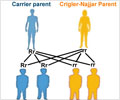For liver transplant recipients without hepatitis C (HCV), survival has improved over time.
For liver transplant recipients without hepatitis C (HCV), survival has improved over time. However, for recipients with HCV, survival has not improved, according to a study in the issue of Liver Transplantation.
HCV-induced liver disease is the most common reason for liver transplantation in the U.S., however, previous studies have shown that these patients do not respond as well to liver transplantation. The difference has become even more striking in recent years, leading some to suggest that survival rates have been decreasing for patients with HCV who have received transplants.Researchers led by Paul Thuluvath of The Johns Hopkins School of Medicine in Baltimore, MD, sought to study a large sample of the liver transplant population to determine if there has indeed been a decline in survival among HCV patients after adjusting for possible confounding factors.
They gathered data from the United Network for Organ Sharing on all adult liver transplantation performed in the U.S. between January 1991 and October 2001. They included 5,708 HCV patients and 16,116 non-HCV patients and performed multivariate analysis to determine the impact of confounding factors on survival.
The proportion of liver transplant patients with HCV increased dramatically over the study time period, from 16.4 percent in 1991 to 54.7 percent in 2001. However, patients with HCV had a lower 3-year survival (78.5 percent) compared to non-HCV patients (81.7 percent.) For the former group, there was no improvement in survival during the study period, in contrast to the latter group.
"In summary, the survival of patients transplanted with HCV is significantly lower than those without HCV," the authors report. "There has been a statistically significant improvement in patient and graft survival for non-HCV recipients between 1991 and 2001, but for HCV recipients, the survival rate has remained unchanged without any obvious explanations."
Another article in the same issue of Liver Transplantation by Luca Belli of Niguarda Hospital in Milan includes observations from another group of HCV positive patients who received liver transplants between January 1990 and December 2002. They noted a trend for better patient survival in recent years, "but the cumulative probability of developing severe recurrent disease remained unchanged," the authors report. They pinpointed the combination of a female recipient receiving an old graft as a strong risk factor for a severe recurrence.
Advertisement
For future studies, she suggests that researchers use large databases to identify trends in liver transplantation, or that they perform studies comparing different management strategies. In the absence of effective antivirals, she concludes, "we are obliged to make sure through a better understanding of factors associated with outcome that we are minimizing harm to patients with our current management strategies."
Source-Eurekalert
SRM/B










